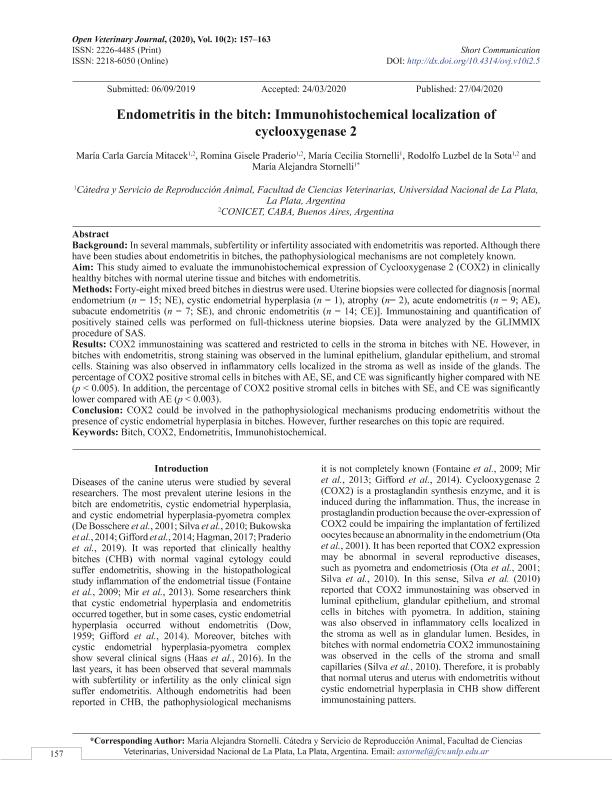Mostrar el registro sencillo del ítem
dc.contributor.author
García Mitacek, María Carla

dc.contributor.author
Praderio, Romina Gisele

dc.contributor.author
Stornelli, María Alejandra

dc.contributor.author
de la Sota, Rodolfo Luzbel

dc.contributor.author
Stornelli, María Cecilia

dc.date.available
2021-07-20T03:25:45Z
dc.date.issued
2020-08-14
dc.identifier.citation
García Mitacek, María Carla; Praderio, Romina Gisele; Stornelli, María Alejandra; de la Sota, Rodolfo Luzbel; Stornelli, María Cecilia; Endometritis in the bitch: Immunohistochemical localization of cyclooxygenase 2; University of Tripoli. Faculty of Veterinary Medicine; Open Veterinary Journal; 10; 2; 14-8-2020; 157-163
dc.identifier.issn
2226-4485
dc.identifier.uri
http://hdl.handle.net/11336/136471
dc.description.abstract
Background: In several mammals, subfertility or infertility associated with endometritis was reported. Although there have been studies about endometritis in bitches, the pathophysiological mechanisms are not completely known. Aim: This study aimed to evaluate the immunohistochemical expression of Cyclooxygenase 2 (COX2) in clinically healthy bitches with normal uterine tissue and bitches with endometritis. Methods: Forty-eight mixed breed bitches in diestrus were used. Uterine biopsies were collected for diagnosis [normal endometrium (n = 15; NE), cystic endometrial hyperplasia (n = 1), atrophy (n= 2), acute endometritis (n = 9; AE), subacute endometritis (n = 7; SE), and chronic endometritis (n = 14; CE)]. Immunostaining and quantification of positively stained cells was performed on full-thickness uterine biopsies. Data were analyzed by the GLIMMIX procedure of SAS. Results: COX2 immunostaining was scattered and restricted to cells in the stroma in bitches with NE. However, in bitches with endometritis, strong staining was observed in the luminal epithelium, glandular epithelium, and stromal cells. Staining was also observed in inflammatory cells localized in the stroma as well as inside of the glands. The percentage of COX2 positive stromal cells in bitches with AE, SE, and CE was significantly higher compared with NE (p < 0.005). In addition, the percentage of COX2 positive stromal cells in bitches with SE, and CE was significantly lower compared with AE (p < 0.003). Conclusion: COX2 could be involved in the pathophysiological mechanisms producing endometritis without the presence of cystic endometrial hyperplasia in bitches. However, further researches on this topic are required.
dc.format
application/pdf
dc.language.iso
eng
dc.publisher
University of Tripoli. Faculty of Veterinary Medicine
dc.rights
info:eu-repo/semantics/openAccess
dc.rights.uri
https://creativecommons.org/licenses/by-nc-sa/2.5/ar/
dc.subject
BITCH
dc.subject
COX2
dc.subject
ENDOMETRITIS
dc.subject
IMMUNOHISTOCHEMICAL
dc.subject.classification
Ciencias Veterinarias

dc.subject.classification
Ciencias Veterinarias

dc.subject.classification
CIENCIAS AGRÍCOLAS

dc.title
Endometritis in the bitch: Immunohistochemical localization of cyclooxygenase 2
dc.type
info:eu-repo/semantics/article
dc.type
info:ar-repo/semantics/artículo
dc.type
info:eu-repo/semantics/publishedVersion
dc.date.updated
2021-07-15T12:23:55Z
dc.identifier.eissn
2218-6050
dc.journal.volume
10
dc.journal.number
2
dc.journal.pagination
157-163
dc.journal.pais
Libia

dc.journal.ciudad
Tripoli
dc.description.fil
Fil: García Mitacek, María Carla. Universidad Nacional de La Plata. Facultad de Ciencias Veterinarias. Instituto de Teriogenología. Cátedra de Reproducción Animal; Argentina. Consejo Nacional de Investigaciones Científicas y Técnicas. Centro Científico Tecnológico Conicet - La Plata; Argentina
dc.description.fil
Fil: Praderio, Romina Gisele. Universidad Nacional de La Plata. Facultad de Ciencias Veterinarias. Instituto de Teriogenología. Cátedra de Reproducción Animal; Argentina. Consejo Nacional de Investigaciones Científicas y Técnicas. Centro Científico Tecnológico Conicet - La Plata; Argentina
dc.description.fil
Fil: Stornelli, María Alejandra. Universidad Nacional de La Plata. Facultad de Ciencias Veterinarias. Instituto de Teriogenología. Cátedra de Reproducción Animal; Argentina
dc.description.fil
Fil: de la Sota, Rodolfo Luzbel. Universidad Nacional de La Plata. Facultad de Ciencias Veterinarias. Instituto de Teriogenología. Cátedra de Reproducción Animal; Argentina. Consejo Nacional de Investigaciones Científicas y Técnicas. Centro Científico Tecnológico Conicet - La Plata; Argentina
dc.description.fil
Fil: Stornelli, María Cecilia. Universidad Nacional de La Plata. Facultad de Ciencias Veterinarias. Instituto de Teriogenología. Cátedra de Reproducción Animal; Argentina
dc.journal.title
Open Veterinary Journal
dc.relation.alternativeid
info:eu-repo/semantics/altIdentifier/doi/http://dx.doi.org/10.4314/ovj.v10i2.5
dc.relation.alternativeid
info:eu-repo/semantics/altIdentifier/url/https://www.ajol.info/index.php/ovj/article/view/198671
Archivos asociados
